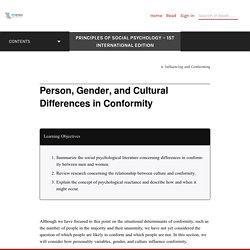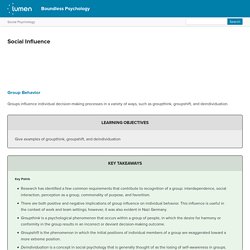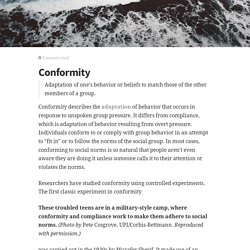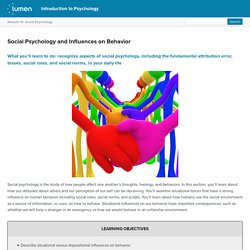

Person, Gender, and Cultural Differences in Conformity – Principles of Social Psychology – 1st International Edition. Summarize the social psychological literature concerning differences in conformity between men and women.Review research concerning the relationship between culture and conformity.Explain the concept of psychological reactance and describe how and when it might occur.

Although we have focused to this point on the situational determinants of conformity, such as the number of people in the majority and their unanimity, we have not yet considered the question of which people are likely to conform and which people are not. In this section, we will consider how personality variables, gender, and culture influence conformity. Person Differences Even in cases in which the pressure to conform is strong and a large percentage of individuals do conform (such as in Solomon Asch’s line-judging research), not everyone does so. There are usually some people willing and able to go against the prevailing norm. Gender Differences Cultural Differences Psychological Reactance References Bartol, K. Bigelow, L. Why Do People Conform? Boundless Psychology. Group Behavior.

Conformity - Determinants Of Personality, Experiment, and Subjects - JRank Articles. Adaptation of one's behavior or beliefs to match those of the other members of a group.

Conformity describes the adaptation of behavior that occurs in response to unspoken group pressure. It differs from compliance, which is adaptation of behavior resulting from overt pressure. Social Psychology and Influences on Behavior. What you’ll learn to do: recognize aspects of social psychology, including the fundamental attribution error, biases, social roles, and social norms, in your daily life Social psychology is the study of how people affect one another’s thoughts, feelings, and behaviors.

In this section, you’ll learn about how our attitudes about others and our perception of our self can be deceiving. You’ll examine situational forces that have a strong influence on human behavior including social roles, social norms, and scripts. You’ll learn about how humans use the social environment as a source of information, or cues, on how to behave. Situational influences on our behavior have important consequences, such as whether we will help a stranger in an emergency or how we would behave in an unfamiliar environment.
Learning Objectives Social psychology examines how people affect one another, and it looks at the power of the situation. Figure 1. Situational and Dispositional Influences on Behavior Figure 2. Attribution Theory - Situational vs Dispositional. Attribution Theory By Saul McLeod, published 2012 Attribution theory is concerned with how ordinary people explain the causes of behavior and events.

For example, is someone angry because they are bad-tempered or because something bad happened? A formal definition is provided by Fiske and Taylor (1991, p. 23): “Attribution theory deals with how the social perceiver uses information to arrive at causal explanations for events. Heider (1958) believed that people are naive psychologists trying to make sense of the social world. Heider didn’t so much develop a theory himself as emphasize certain themes that others took up.
Dispositional vs Situational Attribution Dispositional vs Situational Attribution 1. Dispositional attribution assigns the cause of behavior to some internal characteristic of a person, rather than to outside forces. When we explain the behavior of others we look for enduring internal attributions, such as personality traits. 2.
Jones & Davis Correspondent Inference Theory 1. How Does Conformity Influence Behavior? Conformity involves changing your behaviors in order to "fit in" or "go along" with the people around you.

What is Conformity? What is Conformity?

By Saul McLeod, updated 2016 Conformity is a type of social influence involving a change in belief or behavior in order to fit in with a group. This change is in response to real (involving the physical presence of others) or imagined (involving the pressure of social norms / expectations) group pressure. Conformity can also be simply defined as “yielding to group pressures” (Crutchfield, 1955).
Group pressure may take different forms, for example bullying, persuasion, teasing, criticism, etc. The term conformity is often used to indicate an agreement to the majority position, brought about either by a desire to ‘fit in’ or be liked (normative) or because of a desire to be correct (informational), or simply to conform to a social role (identification). Jenness (1932) was the first psychologist to study conformity. He asked participants individually to estimate how many beans the bottle contained.
Asch Conformity Experiment. Solomon Asch - Conformity Experiment By Saul McLeod, updated Dec 28, 2018 Solomon Asch conducted an experiment to investigate the extent to which social pressure from a majority group could affect a person to conform.

He believed that the main problem with Sherif's (1935) conformity experiment was that there was no correct answer to the ambiguous autokinetic experiment. How could we be sure that a person conformed when there was no correct answer? Asch (1951) devised what is now regarded as a classic experiment in social psychology, whereby there was an obvious answer to a line judgment task. If the participant gave an incorrect answer it would be clear that this was due to group pressure.
Experimental Procedure Experimental Procedure. The dangers of Conformity at the workplace for both workers and employers and in the end society…